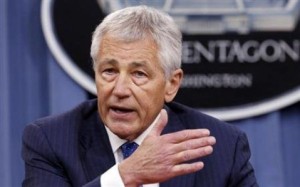 (Reuters) - Defense Secretary Chuck Hagel toured an anti-mine warfare ship in the U.S. Fifth Fleet on Friday to underscore U.S. commitment to Middle East security despite policy differences over�Iran�and�Syria�that have angered Washington's longtime Gulf allies.
(Reuters) - Defense Secretary Chuck Hagel toured an anti-mine warfare ship in the U.S. Fifth Fleet on Friday to underscore U.S. commitment to Middle East security despite policy differences over�Iran�and�Syria�that have angered Washington's longtime Gulf allies.His visit to Bahrain, in which he will also speak at the Manama Dialogue security conference, came at a time of regional unease over President�Barack Obama's�policies ranging from the cautious U.S. response to Syria's civil war to the six world powers' interim deal with�Iran�on its nuclear program.
The warship he toured, the USS Ponce, is to be equipped in 2014 with a new Navy laser weapon designed to deter aircraft and missiles as well as attacks by swarms of small boats like those used by�Iran, on the opposite side of the Gulf.
"Our history in this area is long and proud. Our commitment to our partners in this area speaks for itself and I will assure our partners that we're not going anywhere," Hagel told troops aboard the 40-year-old vessel, recently refitted to be a floating base for anti-mine warfare and special operations.
"This region is dangerous, it's combustible, it's unstable," Hagel said. "But having a steady American hand in this region can help our allies and reassure our allies."
Jon Alterman, director of the Middle East program at the Center for Strategic and International Studies think tank in Washington, said Gulf Arab leaders felt U.S. policy was misguided and that when they wanted to air their concerns, there was no one in the Obama administration to talk to.
"There's been a deep sense that nobody's listening to them," Alterman said. Personal relationships in policymaking are critical in the Gulf, he said, and many regional leaders do not believe they have that kind of connection with Obama.
Alterman said Hagel's task would be to listen to the leaders' concerns, to clearly explain U.S. security moves and to "emphasize the fact that strategically we have very, very closely aligned interests."
Hagel planned to explain U.S. security thinking in a speech on Saturday to the Manama Dialogue, which is broadly attended by defense figures in the Middle East. He met bilaterally with senior leaders from several countries on Friday.
"We are clearly here at a very important time for the region," a senior U.S. official said on condition of anonymity. "It's a somewhat tense time ... There (are) a lot of questions about U.S. policy, about where things are going, particularly in the wake of the Iran interim agreement."
U.S. officials said Hagel, who knows most of the region's leaders from his time in the U.S. Senate, was seen as the best person to deliver a message of reassurance about America's commitment to Gulf security.
"This is a particular region where the relationship between the defense ministers with the secretary of defense has unique importance," another senior U.S. official said, noting the "uniquely insecure environment" and the large amount of defense trade with the United States.
Since 2007, the United States has sold more than $81 billion worth of arms to Gulf countries, including some $10 billion announced by Hagel earlier this year on his first trip to the region as defense secretary, the official said.
Hagel told troops aboard the USS Ponce that Gulf allies should not misconstrue the U.S. military's strategic rebalance to Asia as "retreating from any part of the world".
Iran, which has long vied with Gulf Arabs for regional dominance, struck an interim deal with the six powers on November 24 under which it is to limit aspects of its disputed nuclear energy program in exchange for some relief from sanctions.
Hagel said the deal represented a "very wise opportunity" to see if Tehran was serious about reaching a comprehensive final accord, to be negotiated in coming months, ensuring it would never turn uranium enrichment to making nuclear weapons.
By Reuters
The Iran Project is not responsible for the content of quoted articles.










